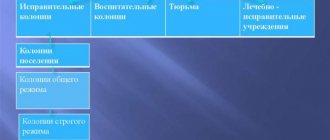The concept of the regime in correctional institutions and its essence
The concept of regime in correctional institutions is formulated in penal legislation. According to Part 1 of Art. 82 of the Criminal Executive Code of the Russian Federation, it is defined as the procedure for the execution and serving of imprisonment established by law and regulatory legal acts corresponding to the law. The rules relating directly to the regime of execution and serving a sentence of imprisonment are contained in Chapter. 12 of the Criminal Executive Code of the Russian Federation. They are specified in the Internal Rules of Correctional Institutions, approved by Order of the Ministry of Justice of Russia dated November 3, 2005 No. 205, Internal Rules of Educational Colonies of the Penitentiary System, approved by Order of the Ministry of Justice of Russia dated October 6, 2006 No. 311.
The regime expresses the essence of punishment in the form of imprisonment; it implements the volume of deprivations or restrictions on the rights and freedoms of the convicted person corresponding to each type of punishment. It is designed to provide: security, isolation of convicts and supervision of them; fulfillment of the duties assigned to them; implementation of their rights and legitimate interests; personal safety of prisoners and staff; separate detention of different categories of convicts; different conditions of detention depending on the type of correctional institution appointed by the court; changing the conditions of serving a sentence.
The regime as a legal phenomenon with its elements permeates all spheres of life in correctional institutions. In the theory of penal law, the main forms of expression of the regime and the functions (Fig. 7).
The regime as an expression of punishment is not only punishment, but also a specific way of life, the way of life of the convicted person, conditioned by imprisonment, based on the requirements of penal legislation. Punishment is traditionally understood as a certain amount of legal restrictions, expressed in the regime established by the legislator for various types of correctional institutions. In addition, the scope of legal restrictions can vary significantly within one correctional institution. Depending on their behavior, convicts in correctional colonies can be kept in strict, ordinary and light conditions (Part 1 of Article 87 of the Criminal Executive Code of the Russian Federation). This primarily concerns the limitation of the social benefits of convicts by providing a number of visits, parcels, packages, parcels, etc., clearly specified in the law. The scope of legal restrictions also changes in connection with the transfer of convicts for positive or negative reasons outside the correctional institution, for example, to a colony-settlement or prison (part 2 and part 4 of article 78 of the Criminal Executive Code of the Russian Federation). Therefore, the punitive function of the regime is implemented by establishing various legal restrictions for convicts in the process of serving a sentence of imprisonment.
Rice. 7. The concept of regime in correctional institutions, forms of its expression and main functions
The regime, personifying the procedure for executing and serving a sentence of imprisonment, is an important factor in strengthening discipline and preventing offenses both among convicts and other persons visiting correctional institutions. Regime requirements ensure the isolation of the convicted person and determine the procedure for exercising supervision and control over convicts using technical means (Article 83 of the Criminal Executive Code of the Russian Federation), provide for the conduct of operational searches (Article 84 of the Criminal Executive Code of the Russian Federation), searches (Part 5 Article 82 of the Criminal Executive Code of the Russian Federation) and other preventive measures in correctional institutions. In relation to other persons visiting correctional institutions, regime rules are aimed at preventing the commission of offenses both in relation to these citizens and by themselves. In particular, the administration of a correctional institution has the right to inspect persons, their belongings, and vehicles located on the territory of the correctional institution and adjacent territories, as well as to confiscate prohibited items and documents (Part 6 of Article 82 of the Criminal Executive Code of the Russian Federation). In this regard, the function of social control (preventive) is expressed in the preventive meaning of a properly organized procedure for the execution and serving of punishment, ensuring the prevention of the commission of new crimes and other offenses by both convicts and other persons.
The regime as one of the main means of correcting convicts is defined in Part 2 of Art. 9 of the Criminal Executive Code of the Russian Federation and is intended to ensure the formation of a respectful attitude towards people, society, work, norms, rules and traditions of human society, as well as to stimulate law-abiding behavior. The requirements of the regime include, for example, the obligatory socially useful work of convicts (Part 1 of Article 103 of the Criminal Executive Code of the Russian Federation), compliance by convicts with the rules of polite treatment among themselves and with the staff of the institution, keeping living quarters and workplaces clean and tidy ( Internal regulations), etc. For violation of these regulations, disciplinary measures are provided. On the contrary, the conscientious attitude of convicts to their duties and their compliance with established rules of behavior can serve as a basis for encouraging the convict. Thus, the educational function of the regime is carried out to a greater extent through coercion and is aimed at educating a person, teaching him discipline, observing the rules of behavior, introducing convicts to civilized relationships, including by stimulating their lawful behavior.
The regime as a condition for the use of other means of correction for convicts received legislative recognition in Part 2 of Art. 82 of the Criminal Executive Code of the Russian Federation. Without the proper procedure for executing and serving a sentence, the use of other means of correction determined by the legislator becomes problematic. On the contrary, the state of the regime, which meets the requirements of penal legislation, creates favorable conditions for educational work, socially useful work, obtaining general education, vocational training and social influence. Thus, the participation of convicts in educational activities provided for by the daily routine of a correctional institution is mandatory (Part 3 of Article 109 of the Criminal Executive Code of the Russian Federation). The duty of persons deprived of liberty is to obtain basic general education if they have not reached the age of 30 years (Part 1 of Article 112 of the Criminal Executive Code of the Russian Federation). Based on this, the supporting function of the regime represents the legal basis for applying corrective measures to convicted persons. The norms of the regime determine the procedure for attracting convicts to work and its organization, the specifics of carrying out educational work with them, receiving general education and vocational training for convicts, as well as the procedure for ensuring the life activities of convicts and organizing their free time. The implementation of these and other requirements is ensured by the regime of deprivation of liberty.
The functions of the regime are implemented in their unity and interconnection; in their totality, they determine the content of the regime of deprivation of liberty.
The Supreme Court explained how and when the mode of serving a sentence can be changed
Article 58 of the Criminal Code of the Russian Federation regulates the appointment by the court of the type of correctional institutions for persons sentenced to imprisonment, and individualizes the execution of punishment.
In order to ensure uniform application of legislation on the appointment and change of types of correctional institutions, the Plenum of the Supreme Court of the Russian Federation, in Resolution No. 9 of May 29, 2014 “On the practice of assigning and changing types of correctional institutions by courts,” gave the courts the appropriate explanations.
When assigning a type of correctional institution, courts must take into account certain criteria: category of crimes, form of guilt, type of punishment imposed (for a certain period or life), term of imprisonment, type of recidivism of crimes, the fact of having previously served a sentence of imprisonment, gender, age.
It should be borne in mind that the criminal law does not allow the possibility of appointing one or another type of correctional institution at the discretion of the court, with the exception of the cases specified in paragraph “a” of Part 2 of Art. 58 of the Criminal Code of the Russian Federation.
Thus, for persons convicted of crimes committed through negligence, as well as persons sentenced to imprisonment for committing intentional crimes of minor and medium gravity, who have not previously served imprisonment, the court may determine the place of serving the sentence as either a settlement colony or a correctional colony general mode.
If in these cases the court comes to the conclusion that it is necessary to appoint a general regime correctional colony for the convicted person to serve his sentence instead of a settlement colony, it must justify the decision made. This takes into account the circumstances of the crime and the identity of the perpetrator, in particular the number of crimes he has committed, their nature and degree of social danger (form of guilt, severity of the consequences, degree of implementation of the criminal intent, method of committing the crime, the role of the convicted person in it, other significant circumstances of the case) ; behavior before and after the commission of a crime, including attitude towards the act, compensation for harm caused by the crime, behavior in a pre-trial detention center, in a correctional institution, if the person previously served imprisonment; having a criminal record; data on the use of alcohol, drugs and other intoxicants, health status, presence of dependents, etc.
Women sentenced to imprisonment for committing serious and especially serious crimes (regardless of the type of recidivism of crimes) are assigned to serve imprisonment in a general regime correctional colony, and in other cases - according to the rules of clause “a”, part 2 of art. 58 of the Criminal Code of the Russian Federation, described earlier.
When a minor is sentenced to imprisonment, the court assigns him to serve his sentence in a correctional colony.
However, if at the time of sentencing such a person has reached the age of majority, he is assigned to a general regime correctional colony (in case of committing a serious or especially serious crime) or a colony-settlement.
At the same time, the Supreme Court of the Russian Federation recommends that courts, simultaneously with the sentencing, issue a ruling (resolution) in which they indicate to the body executing the punishment the need to take into account when dealing with a minor certain characteristics of his personality (level of intellectual and physical development, degree of pedagogical neglect, tendency to use alcoholic beverages, drugs, other data characterizing the personality of a minor).
The presence of a certain type of recidivism of crimes determines the assignment to a person of a corresponding more strict type of correctional institution (a strict or special regime correctional colony).
At the same time, convictions expunged or expunged in the prescribed manner, convictions for crimes committed through negligence, minor gravity, or for crimes for which the conviction was recognized as suspended or the sentence was suspended, are not taken into account when recognizing the recidivism of crimes and therefore cannot be a basis for the appointment of a strict or special regime correctional colony.
When assigning the type of correctional institution, the person’s unexpunged and outstanding criminal records at the time of the commission of the crime are taken into account, therefore, the expiration of the expungement period for a criminal record for one or more crimes during the period of serving the sentence for the last sentence does not entail a change in the type of correctional institution.
If the type of correctional institution is incorrectly assigned, the appellate court has the right to change it to a more lenient or stricter type of correctional institution. However, in this case, a more strict type of correctional institution can be assigned only if there is a presentation from the prosecutor or a complaint from the victim or private prosecutor, their legal representatives and (or) representatives.
If the convicted person is assigned a type of correctional colony with a less strict regime, then the court of cassation (supervisory) instance, within a year after the verdict enters into legal force, if there is a presentation from the prosecutor or a complaint from the victim or private prosecutor, their legal representatives and (or) representatives, cancels the sentence in this case. parts and transfers the case for a new consideration for the appointment of the appropriate type of correctional institution.
For a person serving a sentence of imprisonment, the type of correctional institution can be changed by the court depending on the behavior of the convicted person and his attitude to work, both in the direction of improving the conditions of serving the sentence and in the direction of tightening them.
Maintenance of the regime in correctional institutions
The maintenance of the regime in correctional institutions is a system of rules established in the penal legislation that determine the procedure and conditions for the execution and serving of imprisonment, as well as ensuring the application of correctional means to convicts.
Traditionally, the rules differ: 1) related to the personnel of the correctional institution (rules for the execution of punishment); 2) related to convicted persons (rules for serving sentences); 3) relating to other persons located in correctional institutions and in the territories adjacent to them.
Personnel include persons with special ranks as employees of the penal system, as well as workers and employees of institutions executing punishment. The rules for the execution of punishment related to the personnel of correctional institutions regulate their powers (rights and obligations) when executing imprisonment. In the sphere of the regime of the Penal Code of the Russian Federation and the Law of the Russian Federation of July 21, 1993 No. 5473-1 “On institutions and bodies executing criminal punishments in the form of imprisonment” contain regulations addressed largely to employees of correctional institutions. Employees have the right (and obligation) to implement both general regime requirements relating to convicted and other persons, and requirements addressed separately to each of these categories of citizens. The general requirements for compliance with the regime imposed on employees of correctional institutions include: monitoring compliance with regime requirements at the facilities of correctional institutions and the territories adjacent to them; carrying out operational investigative activities; requiring convicts and other persons to fulfill their duties and comply with the internal regulations of correctional institutions; application of measures of influence and coercion provided for by law in relation to offenders; carrying out an inspection and search of convicts, other persons, their belongings, vehicles located in the territories of correctional institutions, enterprises of these institutions and in the territories adjacent to them, in which security requirements are established, as well as the seizure of prohibited things and documents; proceedings in cases provided for by the legislation of the Russian Federation and the procedure for criminal procedural actions; application and use of physical force, special means and weapons in cases and in the manner prescribed by law.
In relation to convicted persons, employees are additionally vested with the following powers: to carry out their registration, photographing, sound recording, filming and video recording and fingerprinting; conducting a medical examination in order to identify facts of consumption of alcohol, narcotic or toxic substances, and ordering a medical examination of convicts; introduction of a regime of special conditions in the manner established by the Criminal Code of the Russian Federation.
When ensuring the regime in correctional institutions, in the territories adjacent to them, as well as when conducting special operations against other citizens, employees have the right (obligation) to: draw up protocols on administrative offenses, carry out administrative detention and apply other measures provided for by the legislation of the Russian Federation on administrative offenses; when carrying out operations to detain convicts who have escaped or are evading serving a sentence, in places where they are likely to appear, inspect vehicles and check documents; use free of charge the capabilities of the media to search for convicts who escaped; temporarily restrict or prohibit the movement of transport in territories adjacent to penal institutions where security requirements have been established, not allow citizens to enter these territories or oblige them to stay there or leave these territories in order to comply with security requirements, protect the life and health of citizens.
In addition, correctional officers are obliged to ensure the procedure for the execution and serving of imprisonment in accordance with the penal legislation of the Russian Federation, to create conditions for ensuring law and order and legality, the safety of convicts, as well as personnel, officials and citizens located on their territories.
Regime rules relating to convicts (rules for serving a sentence) can be divided into several groups: 1) rules establishing the behavior of convicts while serving imprisonment in general and in a specific correctional institution; 2) rules ensuring the implementation of the rights and legitimate interests of convicted persons; 3) rules governing the application of basic means of correction to convicted persons.
The rules establishing the behavior of convicts while serving imprisonment in general and in a specific correctional institution determine the lifestyle of convicts while serving imprisonment. They are enshrined in the Penal Code of the Russian Federation and specified in the Internal Regulations of Correctional Institutions. These include: separate detention of convicts in correctional institutions; creation of different conditions for serving a sentence in one correctional institution; rules of conduct for a convicted person during work and in free time; relationships between convicts and correctional facility staff; the daily routine of the correctional institution, the order of meals, the movement of convicts within the colony; conducting inspections, visits, receiving parcels, parcels, etc., as well as a list of things and items, food products that convicts are prohibited from having with them, receiving in parcels, parcels, parcels, or purchasing.
An important place in the regulation of serving imprisonment in relation to a specific correctional institution is occupied by the daily routine. It includes the time of getting up, going to bed, going to the toilet, doing physical exercise, eating, leaving for work, being at work, studying, educational and sports events, etc. Submission to the daily routine is mandatory for all convicted persons; for deviation from its requirements, the convicted person may be subject to disciplinary liability.
General rules ensuring the implementation of the rights and legitimate interests of convicted persons are concentrated in Chapter. 13 of the Criminal Executive Code of the Russian Federation. In relation to a specific type of correctional institution, they are specified in Chapter. 16 and 17 of the Criminal Executive Code of the Russian Federation, and the procedure for their implementation is established in the Internal Rules of Correctional Institutions. According to Art. 88 of the Criminal Executive Code of the Russian Federation, those sentenced to imprisonment can purchase food and basic necessities by bank transfer using funds earned while serving their sentence, as well as from received pensions, social benefits and money transfers. These funds are credited to the personal accounts of convicted persons. The funds earned by convicted persons while serving their sentences, pensions and social benefits they receive can be spent without restrictions on purchasing food and basic necessities.
Those sentenced to imprisonment are granted short-term visits lasting 4 hours and long-term visits lasting 3 days on the territory of the correctional institution. In cases provided for by the Penal Code of the Russian Federation, convicts may be granted long visits with accommodation outside the correctional institution for a duration of 5 days. In this case, the head of the correctional institution determines the procedure and place of the meeting. Short-term visits are granted with relatives or other persons in the presence of a representative of the administration of the correctional institution. Long-term visits are granted with the right to live together with a spouse, parents, children, adoptive parents, adopted children, siblings, grandparents, grandchildren, and with the permission of the head of the correctional institution - with other persons (Article 89 of the Criminal Executive Code RF).
In accordance with Art. 90 of the Criminal Executive Code of the Russian Federation, those sentenced to imprisonment are allowed to receive parcels, packages and parcels: a) women and persons held in educational colonies - without limiting the number; b) for men - in the amount established by Art. 121, 123, 125 and 131 of the Criminal Executive Code of the Russian Federation.
Persons sentenced to imprisonment are allowed to receive and send letters and telegrams at their own expense without limiting their number. Correspondence received and sent by convicts is subject to censorship by the administration of the correctional institution. Correspondence of the convicted person with the court, the prosecutor's office, a higher body of the penal system, as well as with the Commissioner for Human Rights in the Russian Federation, the Commissioner for Human Rights in a constituent entity of the Russian Federation, a public monitoring commission created in accordance with the legislation of the Russian Federation, the European Court of Human Rights, censorship is not subject to (Article 91 of the Criminal Executive Code of the Russian Federation).
Federal Law of December 8, 2003 No. 161-FZ “On bringing the Criminal Procedure Code of the Russian Federation and other legislative acts into compliance with the Federal Law “On Amendments and Additions to the Criminal Code of the Russian Federation”” enshrined in Art. 92 of the Criminal Executive Code of the Russian Federation the right of those sentenced to imprisonment to make telephone conversations. In the absence of technical capabilities, the administration of the correctional institution may limit the number of telephone conversations to 6 per year. The duration of each conversation should not exceed 15 minutes. Telephone calls are paid for by convicts at their own expense or at the expense of their relatives.
According to Art. 93 of the Criminal Executive Code of the Russian Federation, convicts serving imprisonment in locked premises, punishment cells, disciplinary cells, cell-type premises, single cell-type premises, general and solitary cells, if they do not work in the open air, have the right to a walk, the duration of which established by Art. 118, 121, 123, 125, 127 and 131 of the Criminal Executive Code of the Russian Federation.
According to Art. 94 of the Criminal Executive Code of the Russian Federation, those sentenced to imprisonment, except those serving a sentence in prison, as well as convicts transferred to punishment cells, cell-type premises, single cell-type premises and solitary confinement, are shown films and videos at least once a week.
Article 95 of the Criminal Executive Code of the Russian Federation allows those sentenced to imprisonment to receive writing materials in parcels, parcels and parcels, to purchase literature through the trading network, and also to subscribe to newspapers and magazines without restrictions at their own expense. In this case, the convicted person is allowed to have no more than 10 copies of books and magazines with him.
Currently, according to Art. 98 of the Criminal Executive Code of the Russian Federation, those sentenced to imprisonment and forced to work are subject to compulsory state social insurance, and convicted women are also provided with maternity benefits in the manner established by the Government of the Russian Federation. Maternity benefits are paid to convicted women regardless of their performance of work duties or other circumstances.
All of the above rules are aimed at realizing the rights of those sentenced to imprisonment, and in Art. 96 and 97 of the Criminal Executive Code of the Russian Federation define the conditions for ensuring certain legitimate interests of this category of convicts. In Art. 96 establishes the conditions and procedure for the movement of persons sentenced to imprisonment without an escort or escort. The main conditions for the realization of this legitimate interest are the positive characteristics of the convicts and the need for them to perform certain work without an escort or escort outside the correctional institution.
Article 97 of the Criminal Executive Code of the Russian Federation provides for the possibility of departure of those sentenced to imprisonment outside correctional institutions. Those sentenced to imprisonment, held in correctional colonies and educational colonies, as well as convicts left in accordance with the established procedure in pre-trial detention centers and prisons to carry out housekeeping work, may be allowed to travel outside the correctional institutions: a) short-term - lasting up to 7 days , not counting the time required for travel there and back, due to exceptional personal circumstances (death or serious illness of a close relative that threatens the life of the patient; a natural disaster that caused significant material damage to the convicted person or his family), as well as for the preliminary resolution of labor issues and the household arrangement of the convicted person after release; b) long-term - for the duration of annual paid leave, and for convicted persons - age pensioners, disabled people of groups I and II, as well as convicted persons who are not provided with work for reasons beyond their control - for a period equal to the time of annual paid leave.
The rules governing the application of basic means of correction to convicts determine the specifics of conducting educational work with convicts serving imprisonment in various types of correctional institutions, involving them in socially useful work, general educational and vocational training, as well as social influence. The rules defining the procedure for applying correctional means to convicts serving imprisonment will be discussed in subsequent chapters.
Rules of the regime relating to other persons in correctional institutions and in the territories adjacent to them. In correctional institutions and in adjacent areas where security requirements are established, there may be various categories of citizens. These are relatives and other persons who arrived on visits with convicts, administration and teachers of evening (shift) educational institutions (schools, educational and counseling centers) at correctional institutions, teachers and masters of industrial training of vocational schools, lawyers and other persons providing legal assistance to convicts , representatives of state bodies, local governments and the public monitoring the activities of correctional institutions, etc. All these persons are obliged, when visiting correctional institutions, to comply with the rules of conduct established by the penal legislation and the Internal Regulations of correctional institutions. Their violation may entail the application of administrative penalties established, for example, by Art. 19.3 of the Code of Administrative Offenses of the Russian Federation for disobedience to a lawful order of an employee of the penal system or Art. 19.12 of the Code of Administrative Offenses of the Russian Federation for the transfer or attempt to transfer prohibited items to persons held in correctional institutions. If there are signs of a crime in the actions of the perpetrator, a criminal case is initiated and he is brought to criminal liability.











